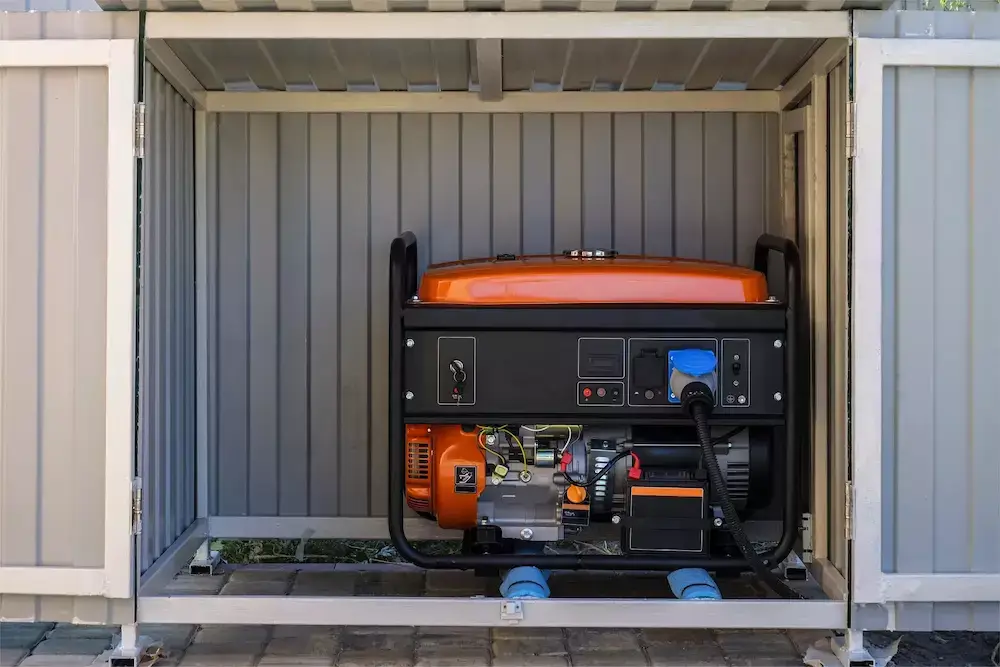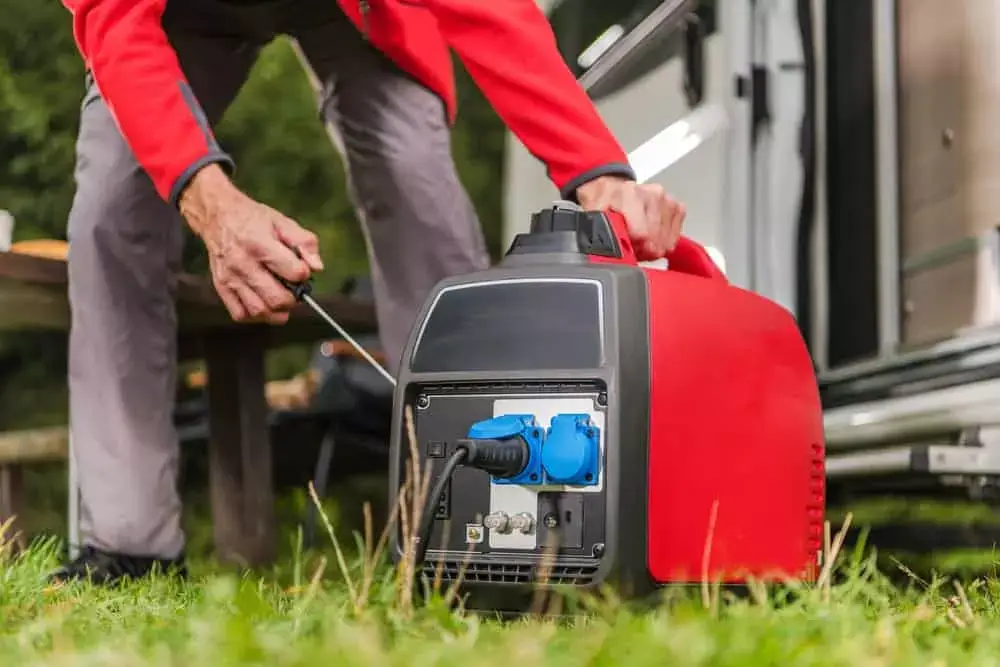Can you run a generator in the garage? It is not a good idea to have a generator running in your garage. There are several reasons for this, one of which is that the generator produces a lot of harmful carbon monoxide.
If you plan on running a generator in your garage, you will need to create an extension tube for emissions and direct it to a windy or airy location outside of your house.
You may wonder whether you can run the generator in the garage with the door unlocked if there is a severe downpour outside and you are mindful that the circuits on your generator and rain are not going to work well together.
To clarify, I am not suggesting that as long as the exhaust is aimed outside and the door is wide open, everything should work outright.
Sadly, that is not the case. It is an illogical proposal to come up with. Because even if everything goes according to plan, you still have the possibility of losing money.
We will explain why you shouldn’t operate the generator in your garage, potential alternatives for individuals who still want to but are not advised to, some basic generator safety guidelines, and the best locations to put your generator to work. Let us get this party started.
But first, we will talk about why a generator is used for.
What Is A Generator Used For?

A mobile generator is an excellent transportable solution for generating temporary electricity. On the other hand, portable generators are solely designed to be used as a backup alternative to supply electricity for specific basic home requirements in an emergency case and recreational activities like camping and using power tools.
There are many different types of portable generators. Some run on diesel or kerosene, while others are fueled by solar energy.
Fuel-powered versions release carbon monoxide when in operation, so you should never use them inside or in close proximity to windows and doors. On the other hand, solar and battery-powered devices can be used both inside and outside.
We will explain to you why you shouldn’t operate the generator in your garage, potential alternatives for individuals who still want to but are not advised to, as well as some basic generator safety guidelines and the best locations to put your generator to work. So let us get this party started.
Higher-wattage generators, like any other kind of generator, have additional alternatives. However, it is essential to remember that various gadgets use varying power when purchasing.
When it comes to powering many devices simultaneously, a 2,500-watt generator can run a coffee machine, a laptop, and an LED television. Still, it might not be able to operate much else.
A 6,000-watt generator, on the other hand, can run a coffee machine, a laptop, a television, and a toaster oven while still leaving enough power for a few other goods.
When determining how much power a generator can provide, be sure that the overall amount of energy required by the devices is not greater than the generator’s capability.
In the case of a gadget with an electric engine, ensure that your generator can handle the device’s initial wattage, as well as the power requirements of any other interconnected devices, before you start using the equipment.
If you want to get a 5000-watt generator, I recommend DuroMax XP5500EH Electric Start-Camping & RV Ready. This device has enough power to operate anything from lights to an air conditioner and high-amperage power instruments like a cordless drill.
Because it can operate on either gasoline or propane, this generator offers you a wide range of fuel options.
Also read: Will A Rope Keep Snakes Away? – Method to Keep Snakes Away
Reasons Why A Generator Should Not Be Used In The Garage
The temptation to use their generators inside has been strong for many households. Our instinct is to avoid doing so, but we attempt to discover workarounds or search for permission and suggestions online from others who have successfully run a generator in their respective garages to be safe.
The following, however, are some strong reasons why you should not use a generator in the garage or anywhere else in the home.
Asphyxiation from Carbon Monoxide
Similar to our automobiles, generators release the same emissions as they do. It is perfectly safe to store our automobiles in the garage since the amount of carbon monoxide created by a car is minimal. Furthermore, the emission ceases after a brief period.
Generators are well-known for releasing very high volumes of carbon monoxide into the atmosphere. According to a scientific study, a single generator may emit the same amount of CO as 100 vehicles at one time.
This is a concerning statistic. And, to make matters worse, a generator is often required to operate constantly for many hours until the electricity system is restored. For example, consider the quantity of carbon monoxide that a generator will release during a 5-hour power outage.
The presence of so much carbon monoxide in your house puts your family’s health in danger. The number of fumes being generated in the garage will quickly permeate into the living room and the bedrooms of your loving family if the situation is not addressed immediately.
It makes no difference how well constructed the wall between the garage and the living space is; this toxic gas will eventually get into your house.
You do not want to endanger the health of your loved ones. Unfortunately, carbon monoxide poisoning has claimed the lives of several homeowners. Many others have become sick as a result of the same problem.
That said, using your generator in the garage is not something I advocate under any circumstances.
You can get a Kidde Carbon Monoxide Detector off Amazon if you want to keep track of the Carbon Monoxide in your home. It alerts you to harmful levels of carbon monoxide in your house by emitting a warning signal.
It is fast and straightforward to set up since it plugs into a conventional wall socket and comes with a 10-year guarantee.
Noise Pollution
In addition to the noise, I doubt you would want a generator operating in my garage. Generators are recognized to be among the noisiest types of electricity generation. I will be apprehensive about entering my house if my garage makes such a raucous noise.
To keep using your home’s air conditioning system, it is possible that starting the generator was part of the plan all along. Starting the generator, this problem will be immediately rectified. On the other hand, the generator’s loudness might keep you up at night.
Homeowners with well-insulated garage walls and doors will not have to worry about noise, but the generator’s buzzing noise will still be heard.
Unnecessary Heat
Generators can generate a significant amount of heat. Because of this, they are keeping it in a confined place such as your garage might cause issues. The majority of garages are poorly ventilated.
In most garages, there are no vents or windows to speak of. Even if they have windows, the homeowners seldom use them since they are difficult to open. This is because they run the danger of being invaded by robbers.
As a result, the garage can become extremely hot and unpleasant to enter, and the generator can get overheated if there is not enough air. As a result, if you operate your generator in the garage, you run the danger of harming it.
A buildup of heat in your garage might also be a possible safety hazard for your house. It has the potential to cause a fire to erupt. This is because we have many goods in the garage that are prone to catching fire.
Recommended: Does Burning Sage Keep Mosquitoes Away? (Expert’s Opinion)
Practical Solutions for Running a Generator in the Garage Safely

The use of a generator in the garage should be avoided at all costs. That has been made very obvious throughout this piece, in my opinion. But, unfortunately, in some instances, you do not have an option but to do what you have to do. So, here are some safe methods for using the generator in the garage.
Make An Extension Tube For Your Generator’s Exhaust Pipes
To operate the generator in the garage, you will need to add an exhaust extension. With installing an exhaust extension, all of the generator’s exhaust emissions may be sent to a well-ventilated region outside your house.
It is necessary to ensure that the generator’s exhaust is securely enclosed by the expansion tube and no leaks in the extension tube.
Additionally, the extension tube must be located at a reasonable distance from your residence as practicable. The tube should be at least 20 feet away from your house for optimal performance.
Instead, you may use a pipeline vent to send it to the top of your home. To prevent precipitation from getting into the generator’s exhaust, ensure the piping is adequately protected.
Ventilate Your Garage To The Maximum Possible Extent
Even if the exhaust is extended, some fumes may still enter the garage. You do not want to take a chance on this, so you will have to ensure that your garage is properly ventilated.
Open all garage doors and windows to allow maximum air circulation. Ensure the generator is located in the airiest part of the garage, preferably right next to the garage door. A high-velocity fan can also be purchased to aid in the removal of any remaining gas from the garage.
Ensure the garage has as much air circulation as possible to prevent toxic smoke from building up. The generator’s poisonous fumes can be exchanged for fresh air by opening the garage door and windows.
I recommend installing an exhaust fan in your garage to improve airflow. Natural ventilation would take much longer to remove the garage’s noxious odors. Get an iPower HIFANXEXHAUST12CTB 12 Inch Variable Shutter Exhaust Fan.
You can cool your garage, basement, greenhouse/shop, or chicken coop with this 12-inch shutter/exhaust fan with automated shutters. Optimizes cooling and removes dangerous CO from the air by attaching a Speed Controller with a window or wall opening.
We strongly advise against choosing this path. That is because even if the fumes exit the garage through the windows and garage door, they can still enter your home. You also put your house at risk of being burglarized.
They can walk right in through the open door of your garage, grab whatever they want, and flee.
When The Generator Is Running, Make The Garage Off Limits.
As long as the generator is operating, you do not want to contact it or anybody else. Because it has no taste or smell, CO may easily poison you without realizing it.
Toxic gasses may still be present even while using a generator in an adequately ventilated garage with a CO monitor. So, the best course of action is to stay away from the area altogether.
You will, of course, have to go inside to start, stop, or refill the generator. Try not to spend any unnecessary time in your garage while working on these tasks.
You should also restrict access to the garage and make sure everyone understands how dangerous it is to go in there. Make sure that children and dogs are not allowed to enter the garage at any time.
Conclusion
A generator running in your garage can expose you and your loved ones to dangerous quantities of carbon monoxide, which may be deadly.
I strongly advise against it. Using an extension tube for the emission of CO and a well-ventilated area in your garage, on the other hand, will allow you to use it there safely.
